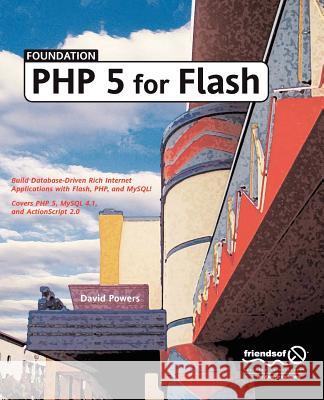Foundation PHP 5 for Flash » książka
Foundation PHP 5 for Flash
ISBN-13: 9781590594667 / Angielski / Miękka / 2005 / 684 str.
Our original Foundation PHP for Flash title was rightly regarded as a must-have when it came to wanting to learn just how to make your Flash sites make use of backend technologies, that was published way back in the days of Flash 5 and PHP 4, and things move pretty fast in the world of web design This latest, completely rewritten, edition again brings together three of the web's hottest technologies--Flash, the server-side language PHP, and the MySQL database system. We've brought things back up to date, using ActionScript 2.0, PHP 5.0, and MySQL 4.1, the book has been designed to be version-neutral. In other words, you can be confident that you're working with the latest standards, but that your applications won't break if deployed on an older server. The book also provides a brief introduction to an alternative database system, SQLite, which is now automatically bundled with PHP 5 and requires no installation.At each stage of the book you'll be given an overview of a new area of PHP/MySQL, introducing you to the syntax while showing how it compares to ActionScript, and how it integrates with Flash to produce increasingly complicated applications. For example, earlier chapters cover things such as getting data from PHP to Flash and back again, variables, arrays, string manipulation, validating user input, and feedback forms. Later on, it moves on to more advanced subjects such as creating databases via the MySQL console and via phpMyAdmin, manipulating database data via a Flash interface, displaying data from an RSS feed in Flash, persisting data with sessions, and creating a full blown content management system.In addition, to get you up and running, the book features a detailed guide to setting up your environment--PHP, MySQL, and the Apache web server--along with extensive troubleshooting information.PHP is the language of choice on nearly 18 million domains, and MySQL has more than five million active users, including industry leaders like Google, the Associated Press, Sony, and NASA. They're open-source and free; and with the help of this book, you'll see that they're easy and fun to learn.











